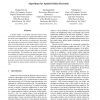Free Online Productivity Tools
i2Speak
i2Symbol
i2OCR
iTex2Img
iWeb2Print
iWeb2Shot
i2Type
iPdf2Split
iPdf2Merge
i2Bopomofo
i2Arabic
i2Style
i2Image
i2PDF
iLatex2Rtf
Sci2ools
ICDM
2003
IEEE
2003
IEEE
Algorithms for Spatial Outlier Detection
A spatial outlier is a spatially referenced object whose non-spatial attribute values are significantly different from the values of its neighborhood. Identification of spatial outliers can lead to the discovery of unexpected, interesting, and useful spatial patterns for further analysis. One drawback of existing methods is that normal objects tend to be falsely detected as spatial outliers when their neighborhood contains true spatial outliers. In this paper, we propose a suite of spatial outlier detection algorithms to overcome this disadvantage. We formulate the spatial outlier detection problem in a general way and design algorithms which can accurately detect spatial outliers. In addition, using a real-world census data set, we demonstrate that our approaches can not only avoid detecting false spatial outliers but also find true spatial outliers ignored by existing methods.
Related Content
| Added | 04 Jul 2010 |
| Updated | 04 Jul 2010 |
| Type | Conference |
| Year | 2003 |
| Where | ICDM |
| Authors | Chang-Tien Lu, Dechang Chen, Yufeng Kou |
Comments (0)

